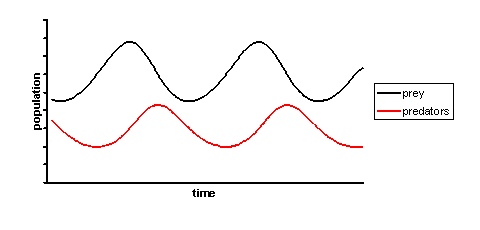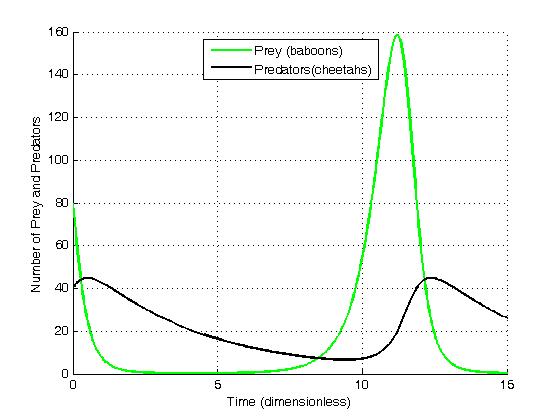What Would It Take To Get To A Steady State Economy?
Gail Tverberg | May 16, 2013 07:11AM ET
Humans live in equilibrium with other species in a finite world. In such a world, there is never really a Steady State. Instead, there is a constant ebb and flow. One species may be dominant in an area for a while, and then another. If populations are closely matched in “ability,” then the ups and downs aren’t too severe. If a predator depends on a particular type of prey for its dinner, it can’t eat all of the prey, or it will go hungry.
When the populations of various species are graphed, they rise and fall. We usually think of a close match, such as depicted in this graph:

Figure 2. Volterra_Lotka equations used to illustrate situation where population of predators and prey do not vary over too wide a range. Source: Wikipedia.
In fact, the variability of the many species over time tends to be greater than this, as illustrated by the following model that started with 80 baboons and 40 cheetahs:

Figure 3. Lotka-Volterra equations used to illustrate situation that begins with 80 baboons and 40 cheetahs. Source: more education of women and availability of birth control measures. Unfortunately, this approach is energy dependent. Unless considerable external energy is available, women will have to work in the fields to produce food. This will give them little time for education or the jobs that education would provide.
There are a some cultures that have been able to keep population down by less energy-dependent means. For example, China uses strict controls from above. Cultural and religious practices may also be used, such as delayed marriage and long breastfeeding. In some cases, abortion or infanticide may be used.
Keeping people from using available energy supplies to improve their lifestyles is even trickier. Some central authority can dictate that the US will use only 7% of the energy the population used in the past, meaning that everyone has to give up nearly everything. But enforcing this will be a real trick, unless energy supplies really are constrained.
There seems to be a common belief that cutting down on personal transportation fuel would have a big impact on total energy consumption. In the US, gasoline amounts to about 44% of US oil consumption. If we eliminated all gasoline consumption (even that by police, ambulances, and sales people), it would only reduce US energy consumption (all types, not just oil) by 16%. On a worldwide basis, much less oil is used for personal transportation, so eliminating all oil for personal transportation would likely reduce world energy consumption by something like 10% to 12%.
Is There a Reason for Aiming for a Steady State Economy?
At this point, we seem to be headed for collapse, because humans’ growth is so far out of line in relationship to that of other species. In addition, we are many other limits, including the cost of oil extraction, availability of fresh water, and amount of pollution (including CO2 pollution). Also, governments are increasingly poor financial condition, because when there are not enough resources to go around, governments tend to “come up short”. They can’t collect enough taxes relative to the benefits they pay out and all of the government programs they administer.
The only way a Steady State would make sense would be if there were some level of Steady State that humans could fall back to, instead of collapse. Unfortunately, it is hard to see a good place to fall back to. The only period where human population was relatively constant was in the period 1 CE to 800 CE, when frequent collapses kept populations down. It is difficult to see any point at which humans have not increased population, or increased resource use, if resources were available, except when frequent civilization collapse overwhelmed the system.
If our civilization does collapse to a lower level, but not all the way back to 0, it seems likely that humans will again repeat the pattern they have experienced, over and over. They will again grow population and resource use, if resources are available. This pattern seems to be an instinct for all species, which is why it is virtually impossible to eliminate. Humans will then again collapse back, to a more sustainable level.
Trading in financial instruments and/or cryptocurrencies involves high risks including the risk of losing some, or all, of your investment amount, and may not be suitable for all investors. Prices of cryptocurrencies are extremely volatile and may be affected by external factors such as financial, regulatory or political events. Trading on margin increases the financial risks.
Before deciding to trade in financial instrument or cryptocurrencies you should be fully informed of the risks and costs associated with trading the financial markets, carefully consider your investment objectives, level of experience, and risk appetite, and seek professional advice where needed.
Fusion Media would like to remind you that the data contained in this website is not necessarily real-time nor accurate. The data and prices on the website are not necessarily provided by any market or exchange, but may be provided by market makers, and so prices may not be accurate and may differ from the actual price at any given market, meaning prices are indicative and not appropriate for trading purposes. Fusion Media and any provider of the data contained in this website will not accept liability for any loss or damage as a result of your trading, or your reliance on the information contained within this website.
It is prohibited to use, store, reproduce, display, modify, transmit or distribute the data contained in this website without the explicit prior written permission of Fusion Media and/or the data provider. All intellectual property rights are reserved by the providers and/or the exchange providing the data contained in this website.
Fusion Media may be compensated by the advertisers that appear on the website, based on your interaction with the advertisements or advertisers.